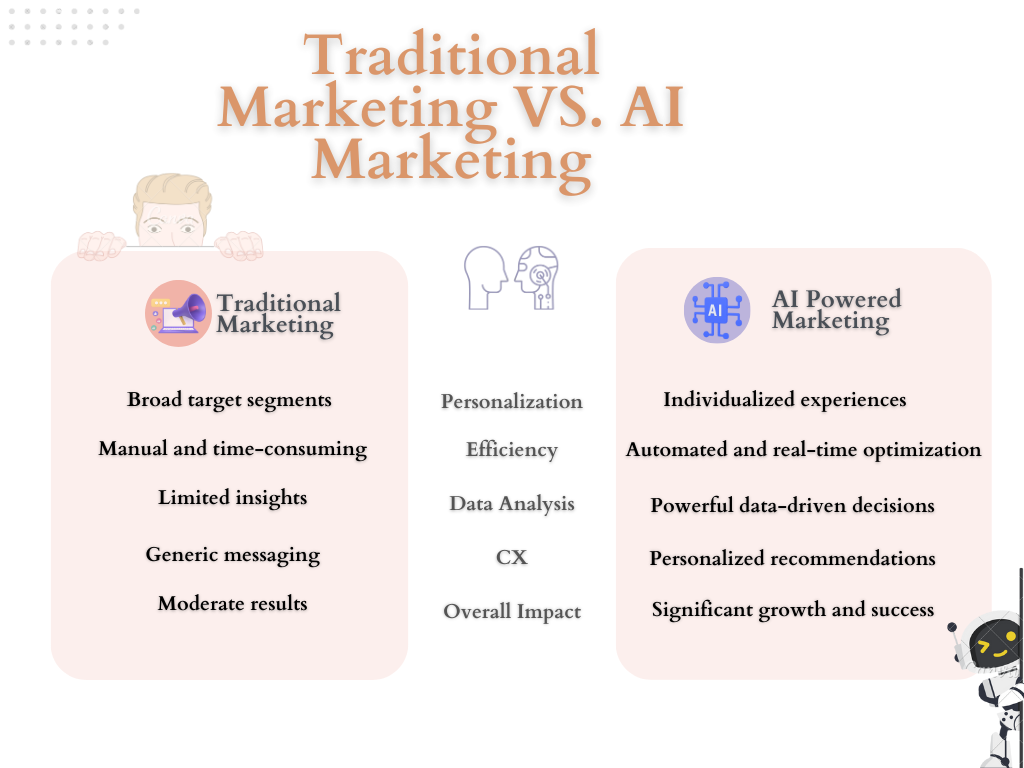Others
The Pros and Cons of AI in Marketing: An Analysis
Article written by Kate Williams
Content Marketer at SurveySparrow
9 min read
18 February 2026

Are you curious about the role of artificial intelligence (AI) in marketing? Wondering how it impacts businesses and if it’s the right choice for your marketing strategy? Look no further! In this blog, we’ll delve into the pros and cons of AI in marketing, shedding light on its benefits and challenges.
From streamlining processes to enhancing customer experiences, AI is transforming the way businesses connect with their target audience. But it’s not without its drawbacks. So, let’s embark on this journey to explore the exciting world of AI marketing and discover how to make the most of its potential while avoiding pitfalls.
What is AI Marketing?
You must be well acquainted with what AI is and what its use cases are by now. Now comes the real question. What’s the deal with AI Marketing?
AI marketing isn’t just a buzzword; it’s a transformative force that’s reshaping the marketing landscape.
At its core, AI marketing empowers marketers with the ability to tap into vast amounts of data and extract meaningful insights. It’s like having a team of supercharged analysts and strategists working alongside you, helping you navigate the complexities of the modern marketing landscape.
Marketers can tap into a goldmine of data, analyze it, and make data-driven decisions to drive better results with AI algorithms. It’s like having a marketing wizard on your side, helping you create personalized campaigns, target the right audience, and deliver exceptional customer experiences.
So, how does AI marketing work its magic?
It all starts with data. Mountains of data.
- AI algorithms feed on this data, analyzing it to uncover patterns, trends, and valuable insights.
- This allows marketers to segment their audience more effectively, identify opportunities, and make informed decisions. AI tools help automate tasks like content creation, campaign optimization, and customer segmentation, freeing up time for marketers to focus on strategic planning.
- With continuous learning capabilities, AI algorithms improve their performance over time, fine-tuning their predictions and recommendations to deliver better outcomes.
Imagine being able to predict customer preferences, anticipate their needs, and deliver tailored experiences that make them feel truly valued. With AI marketing, it’s not just a dream—it’s a reality.
The Pros of AI in Marketing
Why AI Marketing, you ask?
Let’s take a look at a comparison between traditional marketing and AI powered marketing to get a better understanding of the benefits of AI in marketing.

1. Personalization
- Traditional marketing often struggles to cater to individual preferences and needs. AI-powered marketing, on the other hand, revolutionizes personalization.
- By analyzing vast amounts of data, AI algorithms can uncover valuable insights about customer behaviors, interests, and preferences. This is especially useful in email marketing where tools like Mailchimp let users personalize experiences based on past engagement.
- Armed with this knowledge, marketers can create highly tailored experiences that resonate with customers on a deep level.
- From personalized product recommendations to customized messaging, AI empowers businesses to deliver exceptional experiences that leave a lasting impression.
2. Efficiency
- In traditional marketing, manual and time-consuming processes can hinder efficiency and scalability. AI-powered marketing flips the script by automating tasks and streamlining workflows.
- With AI algorithms at work, marketers can optimize campaigns in real-time, ensuring that every marketing dollar is maximized for impact.
- From dynamic pricing to automated content creation, AI enables marketers to achieve more with less effort, freeing up time for strategic thinking and creativity. This includes tools like Heygen’s AI video generator, which can automate video production for faster, scalable campaigns.
3. Data Analysis
- Traditional marketing relies on limited insights and guesswork. In contrast, AI-powered marketing harnesses the power of data analysis to drive decision-making.
- AI algorithms excel at processing vast datasets, identifying patterns, and extracting actionable insights.
- Marketers can leverage this wealth of information to uncover hidden trends, understand customer preferences, and make data-driven decisions that deliver tangible results.
- With AI, marketers become data scientists, armed with powerful tools to unlock the full potential of their marketing strategies.
4. Customer Experiences
- Traditional marketing often treats customers as a collective, delivering generic messaging and experiences. AI-powered marketing flips the script by placing the customer at the center of the strategy.
- By analyzing individual customer data, and behaviors, AI algorithms enable marketers to create personalized experiences at scale.
- Whether it’s personalized recommendations, targeted offers, or interactive chatbots, AI ensures that every touchpoint with the customer feels relevant, meaningful, and engaging.
5. Overall Impact
- The impact of AI-powered marketing goes far beyond incremental improvements. It can lead to significant growth and success for businesses.
- By harnessing the power of personalization, efficiency, data analysis, and exceptional customer experiences, AI-powered marketing unlocks new levels of customer engagement, higher conversion rates, and increased customer satisfaction.
- It’s a paradigm shift that redefines what’s possible in the marketing world.
The Cons of AI in Marketing
While AI presents exciting opportunities, it’s crucial to be aware of the challenges it brings. Let’s explore some of the cons of AI in marketing:
1. Data Privacy Concerns
- AI relies heavily on customer data, which raises concerns about privacy and security.
- Marketers must ensure that data collection and usage comply with privacy regulations and gain customers’ trust by being transparent about their data practices.
2. Lack of Human Touch
- Although AI enables personalized experiences, it can sometimes lack the human touch.
- Some customers still prefer interacting with human agents for complex issues or emotional support, highlighting the importance of finding the right balance between automation and human interaction.
3. Implementation Complexity
- Integrating AI into existing marketing processes requires careful planning and technical expertise. It may involve significant investments, both in terms of technology and training.
- Businesses must be prepared for the initial challenges associated with AI implementation.
4. Ethical Considerations
- AI algorithms are only as good as the data they’re trained on. Biased or incomplete datasets can lead to biased outcomes or unethical practices.
- It’s crucial for marketers to ensure that AI applications are fair, unbiased, and aligned with ethical standards.
How to Navigate the Opportunities and Challenges of AI in B2B Marketing
Here are some strategies to navigate the pros and cons of AI in marketing effectively:
#1 Define Clear Business Objectives
- Start by clearly defining your B2B marketing objectives. Understand how AI aligns with your goals and identify specific areas where AI can add value.
- By having a clear roadmap, you can prioritize AI solutions that address your business needs and avoid unnecessary complexities.
#2 Choose the Right AI Tools
- Conduct thorough research to identify AI tools and platforms that align with your B2B marketing requirements.
- Consider factors such as ease of integration, scalability, and compatibility with your existing systems. Look for AI solutions that provide a seamless user experience and robust features that cater to your specific marketing needs.
#3 Invest in Data Quality
- Garbage in, garbage out. AI’s effectiveness depends on the quality and cleanliness of your data.
- Ensure your data is accurate, complete, and up-to-date. Cleanse and organize your data to maximize the effectiveness of AI algorithms and get the most reliable insights.
- Consider investing in data analytics tools that can help you make sense of the vast amount of data at your disposal.
#4 Emphasize Transparency and Privacy
- Be transparent with customers about your data collection and usage practices. Communicate your commitment to data privacy and comply with relevant regulations. Building trust is crucial to fostering long-term relationships.
- Communicate your data collection and usage policies clearly to build trust and ensure compliance with data privacy regulations.
- Regularly audit your AI systems to identify and mitigate any biases or ethical concerns that may arise.
#5 Augment AI with Human Expertise
- AI is a powerful tool, there’s no doubt. But human creativity, empathy, and critical thinking are irreplaceable.
- While AI brings immense value, it’s important to strike the right balance between automation and human expertise. Recognize that AI is a tool that enhances human capabilities, not a replacement for human intelligence.
- Combine the power of AI-driven insights with the creativity, empathy, and critical thinking of your marketing team. This human-AI collaboration can yield powerful results and ensure that your B2B marketing efforts remain effective and empathetic.
#6 Continuously Monitor and Evaluate Performance
- Regularly monitor and evaluate the performance of your AI-powered marketing initiatives.
- Set key performance indicators (KPIs) aligned with your objectives and track them consistently. Leverage AI analytics tools to gain insights into campaign performance, customer engagement, and ROI.
- By monitoring and analyzing the outcomes, you can make data-driven adjustments and optimize your AI strategies for better results.
How to Choose the Right AI Tools and Platforms
When it comes to AI-powered marketing, selecting the right AI marketing tools and platforms is crucial for success.
Consider these key factors:
- Versatility and Integration: Look for AI tools that seamlessly integrate with your existing marketing ecosystem.
- Intelligent Surveys: SurveySparrow’s AI-driven survey platform goes beyond traditional surveys.
- Real-Time Feedback: Engage with customers, capture sentiments, and respond swiftly to their needs.
- Data Analysis and Reporting: Visualize responses, identify trends, and drive informed decision-making.
You can consider advanced tools such as SurveySparrow. It is a versatile platform that offers AI-powered solutions for enhanced customer engagement and valuable insights. You can create interactive surveys that adapt based on respondents’ answers, providing personalized experiences and deeper insights.
Wrapping up
Phew! We’ve covered a lot of ground here.
AI in marketing is a game-changer, opening doors to personalized experiences, efficient campaign optimization, and data-driven decision-making. However, it’s important to navigate the challenges of data privacy, the human touch, implementation complexity, and ethical considerations.
By understanding the pros and cons, businesses can leverage AI’s potential while upholding ethical standards and delivering exceptional customer experiences. Ready to embark on your AI-powered marketing journey? Why not try SurveySparrow today to learn more and unlock the transformative power of AI in marketing?
14-Day Free Trial • No Credit Card Required • No Strings Attached

Thousands of brands trust SurveySparrow to turn feedback into growth. Try it free today!
Kate Williams
Related Articles




